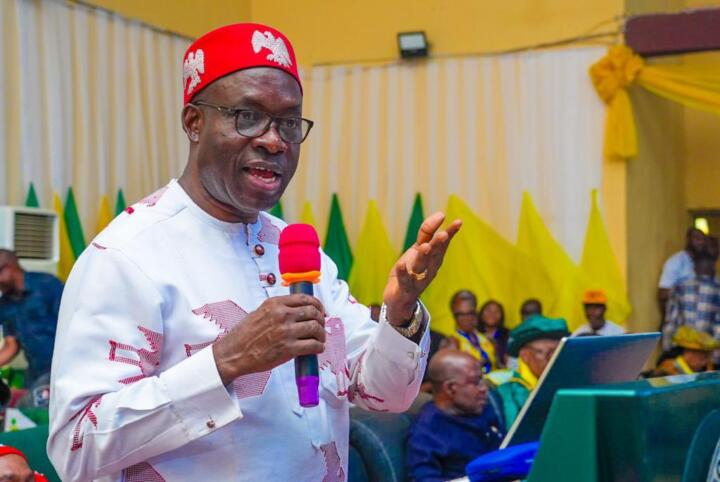Anambra State Governor, Prof. Chukwuma Charles Soludo, has expressed strong support for President Bola Tinubu’s ongoing economic reforms, insisting that the policy direction of the current administration is the right approach to reposition Nigeria for long-term stability and sustainable growth.
Speaking to journalists after a high-level economic review meeting, Soludo maintained that while some of the measures being implemented have triggered short-term discomfort for citizens, they are critical steps needed to fix deep-rooted structural problems that have plagued the nation’s economy for decades.

According to the governor, President Tinubu inherited an economy weighed down by unsustainable fuel subsidies, distortions in the foreign exchange market, rising debt obligations, and declining investor confidence. He argued that such an economic situation called for bold and sometimes unpopular decisions. “When you are trying to fix something that has been faulty for years, you cannot expect instant comfort,” Soludo stated. “What the President is doing is laying a solid foundation for sustainable development. These are not cosmetic changes; they are real, structural reforms that Nigeria has delayed for far too long.”
Soludo identified the removal of fuel subsidies as one of the most significant steps towards economic recovery. While acknowledging that the move has led to higher transportation and living costs, he said it was necessary to halt the massive fiscal leakages and diversion of public funds that the subsidy regime had encouraged for years. He noted that savings from the subsidy removal could now be redirected to critical infrastructure, healthcare, education, and other sectors that directly impact the lives of Nigerians.
The Anambra governor also commended the unification of Nigeria’s exchange rates, describing it as a courageous decision that would enhance transparency, boost investor confidence, and reduce arbitrage opportunities that had previously benefited only a privileged few. “The multiple exchange rate system was a source of inefficiency and corruption. The unification may be painful initially, but over time it will create a more predictable and stable environment for both local and foreign investors,” he said.
In addition, Soludo praised the administration’s efforts to improve agricultural production, industrial output, and infrastructure as part of a broader strategy to diversify the economy away from overdependence on oil revenues. He highlighted the importance of increasing local production capacity to reduce import dependence, strengthen the naira, and create jobs for Nigeria’s growing youth population.
On the rising cost of living, Soludo acknowledged the hardship many households are facing but urged Nigerians to be patient and look beyond the immediate challenges. He said the federal government, in collaboration with state governments, is working on targeted social intervention programmes designed to provide relief to vulnerable groups, including cash transfers, subsidised agricultural inputs, and expanded public works programmes. He stressed that state governments must complement the federal reforms by implementing policies at the sub-national level that support economic growth and protect the most vulnerable citizens.
Soludo’s endorsement of Tinubu’s economic reforms comes at a time when public opinion remains sharply divided. While some Nigerians and business leaders have welcomed the reforms as necessary for long-term stability, labour unions and civil society organisations have criticised the administration for not doing enough to cushion the immediate impacts of the policies, particularly for low- and middle-income households. National strikes and protests have been organised in recent months, with calls for wage adjustments, price controls, and stronger social safety nets.
Responding to such criticisms, the Anambra governor maintained that while palliative measures are important, the ultimate relief will come from building a strong and self-sustaining economy. “The best way to help Nigerians is to fix the structural problems that keep us in cycles of economic crisis,” he said. “Short-term relief is necessary, but it should not derail the fundamental reforms we need to secure our economic future.”
Soludo also emphasised that the current economic transition should be seen as an opportunity to reimagine Nigeria’s growth model. He called for deeper investments in renewable energy, technology, and education, arguing that these sectors will be critical in driving competitiveness in a rapidly changing global economy. He urged both the public and private sectors to work together in supporting innovation and entrepreneurship.
The governor expressed optimism that if the reform agenda is sustained, Nigeria will, within a few years, see measurable improvements in key economic indicators, including GDP growth, inflation control, currency stability, and job creation. He argued that the country’s large population, abundant natural resources, and strategic geographic location give it a competitive advantage that can be harnessed effectively once the economy is placed on the right track.
He concluded by reiterating his confidence in the President’s economic vision. “It’s a difficult journey, but it’s the right one,” Soludo said. “We must endure the transition period so that the future can be better for all. Nigeria has delayed these reforms for too long. Now that they have started, we should all work to ensure their success. The temporary discomfort we are feeling today will pave the way for prosperity tomorrow.”
For Soludo, the debate over Tinubu’s economic policies is not just about immediate outcomes but about charting a sustainable path for future generations. He believes that while the road ahead may be challenging, the reforms, if implemented consistently and supported by strong governance, will place Nigeria on a trajectory towards lasting economic transformation.
Support InfoStride News' Credible Journalism: Only credible journalism can guarantee a fair, accountable and transparent society, including democracy and government. It involves a lot of efforts and money. We need your support. Click here to Donate
